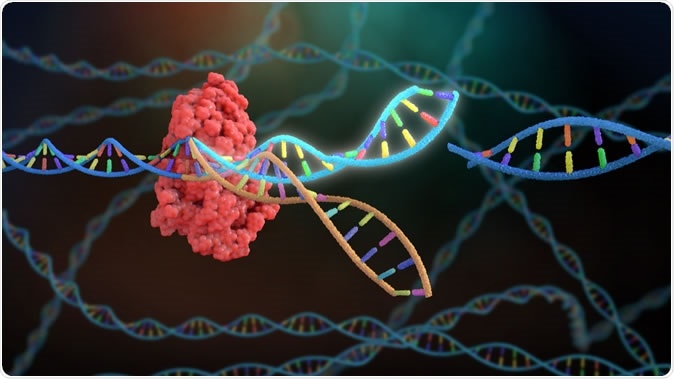Immunotherapy is one of the latest and most effective armaments against various types of cancers. Some of the immunotherapy drugs such as PD-1 inhibitor Keytruda from Merck can block certain proteins in the cancer cells that can make the cells invisible to the immune system normally. Some of the cancers cells can now develop other ways to disguise themselves from being killed by the immune system.
To get around this subterfuge, the researchers from Yale University have devised a new plan. They have published a study in which they experimented with gene therapy to help the immune system to find tumour cells that are invisible to the immune system. The study titled, “Multiplexed activation of endogenous genes by CRISPRa elicits potent antitumor immunity,” was published this week in the latest issue of the journal Nature Immunology.

3D Rendering Crispr DNA Editing. Image Credit: Nathan Devery / Shutterstock
The team of researchers combined gene editing with CRISPR along with gene therapy. There is an activation of the CRISPR which is transported into the cells using adenoviral vectors. This technique could identify thousands of cancer related genes and when it detected these genes, it marked these cells so that the immune system can detect and tackle these rogue cells. They have named their technique “multiplexed activation of endogenous genes as immunotherapy (MAEGI)”. The team writes that it is “a new form of immunotherapy that elicits antitumor immunity through multiplexed activation of endogenous genes in tumors.” According to the Yale scientists, their study has shown success in cases of pancreatic cancers, triple negative breast cancer and in melanoma models of mice. Once the researchers are sure of its safety and effectiveness, pilot clinical trials would be started upon.
The team of researchers explained that their system of MAEGI can spot all the cells in the body carrying the cancer related genes and then transform the cancer cells which do not contain immune cells into those that contain immune cells. The cancer tissues without immune cells are called “cold” tumours while those tissues that allow the immune system to identify them are called “hot tumours”. The authors wrote that the hot tumours had, “enhanced T cell infiltration and antitumor immune signatures”. Once a cold tumour becomes hot, it allows the immune system to attack and kill the cancer cells explain the researchers. Senior author Sidi Chen, assistant professor of genetics at Yale, explained, “And once those cells are identified, the immune system immediately recognizes them if they show up in the future.” In this manner the technique could be used both as prophylaxis of cancer as well as for its treatment explained Chen.
The authors wrote explaining the process, “We leveraged CRISPR activation (CRISPRa) to directly augment the in situ expression of endogenous genes, and thereby the presentation of tumor antigens, leading to dramatic antitumor immune responses.” They called this a “cell-based vaccination strategy” that could be used both for prevention of the tumours and its treatment. Researchers used adenoviruses as vectors to carry the CRISPRa libraries into the tumours, they explained. They wrote that their technique “elicited strong antitumor immunity across multiple cancer types.” Their technique helped treat both local and distant tumours they wrote.
The authors of the study wrote in conclusion, “Multiplexed endogenous gene activation is a versatile and highly scalable strategy to elicit potent immune responses against cancer, distinct from all existing cancer therapies.”
Immuno-oncology is a branch of experimental study that looks at use of the body’s immune system to fight off the cancer. Scientists at Cedars-Sinai Medical Center, earlier in 2019 have come up with Bristol Myers-Squibb’s Sprycel that raised the efficacy of anti-PD-1 drug in many of the cancers. Since then the makers of the drug have started upon clinical trials where they have used a combination of anti-PD-1 drug Opdivo with Sprycel in non-small cell lung cancer. Researchers at the Icahn School of Medicine at Mount Sinai have also shown success with anti-PD-1 and anti-CTLA-4 drugs combination in mice models of lymphomas. Thus the success of immune-oncology has been documented more than once say the researchers. This team says that MAEGI needs to be optimized as a next step in order to prepare it for use on humans in clinical trials. According to Chen, this therapy would benefit several forms of tumours including breast and pancreatic cancers and also those tumours that have been resistant to immunotherapy till date.
First authors of the study include Yale’s Guangchuan Wang and Ryan D. Chow while the study is co-authored by Charles Fuchs, Yale Cancer Center director. The study was funded by the National Institutes of Health.
Journal reference:
Multiplexed activation of endogenous genes by CRISPRa elicits potent antitumor immunity, Guangchuan Wang, Ryan D. Chow, Zhigang Bai, Lvyun Zhu, Youssef Errami, Xiaoyun Dai, Matthew B. Dong, Lupeng Ye, Xiaoya Zhang, Paul A. Renauer, Jonathan J. Park, Li Shen, Hanghui Ye, Charles S. Fuchs & Sidi Chen, https://www.nature.com/articles/s41590-019-0500-4